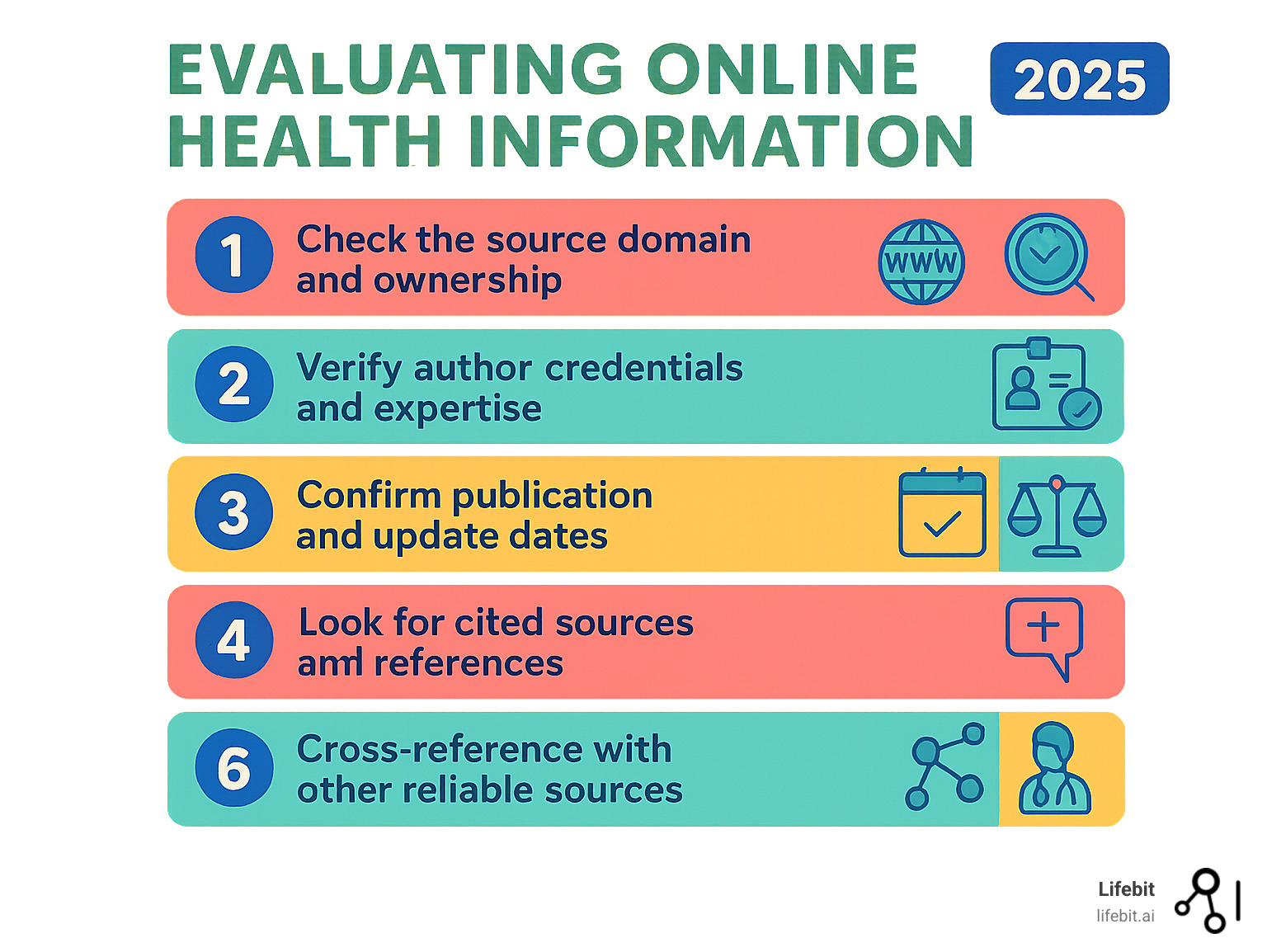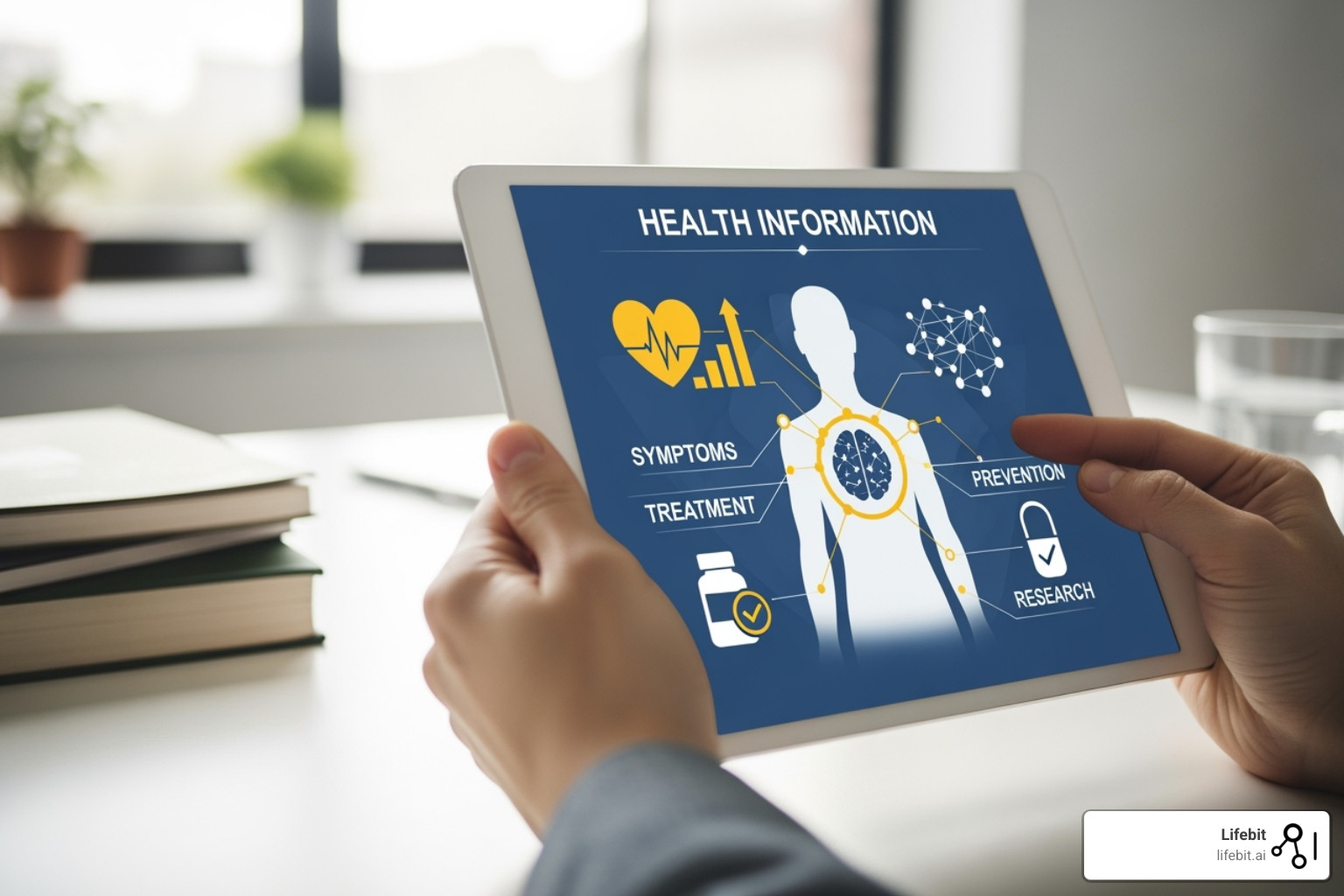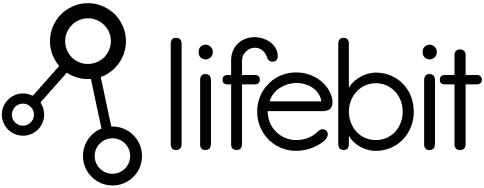Unlocking Health Information: Understanding Your Medical Records

Health Information: Unlock 1 Trusted Guide 2025
Why Health Information Quality Matters More Than Ever
Health information is more accessible than ever, but not all of it is trustworthy. With an estimated 74% of U.S. adults using the internet for health answers, many struggle to separate reliable sources from misleading content. The stakes are high, as unreliable information can lead to delayed treatment, harmful self-medication, or anxiety, while trustworthy sources empower patients to make informed decisions with their healthcare providers.
Key characteristics of reliable health information:
- Government sources (.gov domains) like NIH and CDC
- Academic institutions with medical expertise
- Professional organizations with peer-reviewed content
- Clear author credentials and publication dates
- Cited sources and references to studies
- Unbiased presentation without a product sales focus
For organizations, the challenge extends to ensuring data quality, security, and compliance across complex systems, from electronic health records to genomics datasets that drive research and regulatory decisions.
I’m Maria Chatzou Dunford, CEO and Co-founder of Lifebit. With over 15 years in computational biology and biomedical data, I’ve seen how critical data quality and accessibility are for advancing healthcare outcomes through secure, large-scale analysis of health information.

Health information basics:
The Digital Health Landscape: Navigating a Sea of Information
When you search for a symptom online, you’re flooded with results ranging from respected medical institutions to anonymous blogs promising miracle cures. This is today’s digital health landscape, where health information is abundant, but so is misinformation. The internet provides instant access to medical knowledge, but not all sources are created equal.
The risks of relying on unreliable sources are serious. Misleading health information can lead to delayed treatment, wasted money on fraudulent products, or unnecessary anxiety. Many adults are rightly cautious about trusting online health content. Social media and mobile health apps add complexity, as content from friends or unvetted app developers may seem trustworthy but lack a credible source.

Differentiating Between Information and Commerce
A key skill is recognizing whether a website wants to inform you or sell to you. Informational websites, like those from government agencies (CDC, NIH) and academic institutions, prioritize education over profit. Their goal is public health. Commercial websites, however, often frame information to support a product they’re selling.
Trustworthy informational sites identify their experts, cite peer-reviewed studies, and present balanced information. They sound objective and cautious (“studies suggest”). Commercial sites often use vague credentials, testimonials, and sensational language (“miracle cures,” “secret formulas”) to promote products. Their tone is overly optimistic, promising quick fixes.
The Dangers of Unreliable Health Information
The consequences of trusting bad health information can be severe.
- Misdiagnosis and delayed treatment: Relying on inaccurate online information to self-diagnose can cause you to miss warning signs of serious conditions, allowing them to progress.
- Harmful “cures” and dangerous self-medication: Unproven supplements, risky diets, or treatments promoted on untrustworthy sites can cause dangerous side effects or interact with medications.
- Financial exploitation: Scammers prey on desperation, selling expensive and ineffective products. Health authorities like MedlinePlus offer resources to help you learn how to spot health fraud scams.
- Anxiety and mental health impact: Conflicting and sensationalized health information can create a cycle of worry and stress, which can negatively affect your physical health.
How to Find and Evaluate Reliable Health Information
Finding trustworthy health information online is manageable once you know where to look and what to look for. Think of it as developing a mental checklist to evaluate sources.
Start with government agencies like the National Institutes of Health (NIH) and the Centers for Disease Control and Prevention (CDC), which are gold standards for reliable health information. Academic institutions, university medical centers, and professional organizations like the American Heart Association are also excellent resources. Approach any new website with a systematic evaluation process.
Key Characteristics of Reliable Health Information
Look for these signs of credibility on any site offering health information:
- Author credentials: The author’s qualifications (MD, PhD, RN) should be clearly stated. Anonymous content is a red flag.
- The “About Us” section: Trustworthy organizations are transparent about their mission and funding, which helps you spot conflicts of interest.
- Publication and review dates: Medical knowledge changes fast. Look for recently published or updated content. No date often means no credibility.
- Cited sources: Quality health information is backed by links to scientific studies or other authoritative sources.
- Objective tone: Reliable sites present information factually, discussing risks and benefits, and avoid sensational language.
- Contact information: Legitimate organizations provide ways to contact them, showing accountability.
MedlinePlus offers an excellent guide to Evaluating Health Information that reinforces these principles.
Spotting Red Flags and Health Fraud
Just as important is learning to spot these warning signs:
- “Miracle cure” claims: Real medicine rarely offers quick, one-size-fits-all solutions. Be skeptical of promises to cure chronic diseases overnight.
- Conspiracy theories: Claims of suppressed cures or “big pharma” cover-ups without solid evidence are a major red flag.
- “Secret ingredients” or vague claims: Legitimate treatments are transparent. If a site won’t say what’s in a product, it probably doesn’t work.
- Unprofessional presentation: Poor grammar and spelling often indicate a lack of credibility.
- Emotional manipulation: Fear-mongering or high-pressure sales tactics (“limited time offer”) are signs of a commercial interest, not a health one.
- Over-reliance on testimonials: Personal stories are not scientific evidence. A treatment’s effectiveness must be proven in broad studies.
Navigating Social Media and Mobile Apps
Social media and apps present unique challenges for finding reliable health information.
- Social Media: Treat health content on social platforms with extreme caution. Always trace information back to its original, reputable source (e.g., a government agency or medical journal).
- Mobile Apps: Scrutinize health apps before use. Look for apps developed by established healthcare organizations. Read the privacy policy to understand how your sensitive health information is collected and used. User reviews can indicate usability but do not validate medical accuracy.
Protecting Your Data and Understanding Its Power
In our digital age, your personal health information is both valuable and vulnerable. Protecting it is essential, but when properly anonymized and secured, this data can also help researchers develop life-saving treatments.
Best Practices for Protecting Your Personal Health Information Online
Follow these habits to keep your data secure:
- Use secure websites with “https://” and a padlock icon in the address bar before entering personal information.
- Create strong, unique passwords for each health account and enable two-factor authentication whenever possible.
- Avoid accessing sensitive health information on public Wi-Fi. Use your phone’s data connection instead. The FTC offers how to safely use public Wi-Fi networks.
- Share your Social Security number only when absolutely necessary on secure, official sites. The SSA has guidance on protecting your Social Security number.
- Read privacy policies to understand how your health information will be collected, used, and shared.
The Role of Data in Advancing Medicine
While protecting individual data is crucial, the collective power of securely managed health data is changing medicine.
- Real-world data from sources like electronic health records provides insights into how treatments work in everyday life. Our post on Real-World Data in Clinical Research: Insights explores this further.
- Artificial intelligence analyzes vast datasets to identify patterns, helping doctors tailor treatments to an individual’s unique profile. Learn more in our insights into AI for Precision Medicine.
- Genomics, the study of your genetic code, is central to predicting disease risk and treatment effectiveness. Our blog on Genomics explains its impact.
The challenge is using this data while ensuring security. Federated data analysis is a game-changing approach that allows analysis without data ever leaving its secure location. Our post on Federated Data Analysis explains how this enables global collaboration while maintaining privacy. At Lifebit, we pioneer this secure approach, allowing researchers to collaborate on breakthrough findings while your personal data remains protected.
Putting Knowledge into Practice: Partnering with Your Provider
Finding reliable health information is the first step; the next is discussing it with your healthcare provider. This collaborative approach, known as shared decision-making, leads to better health outcomes and greater confidence in your care.
Your doctor is your partner in making sense of the health information you gather. They can help you understand what applies to your specific situation. To make these conversations effective, it’s important to prepare for appointments.
How to Effectively Discuss Online Findings with Your Doctor
Instead of bringing a stack of printouts, use a more focused approach:
- Bring a summary: Distill your research into your top three questions or concerns. Note the reputable sources you used.
- Ask open-ended questions: Instead of self-diagnosing, try, “I read about these symptoms online. What are your thoughts?” This invites their expertise.
- Be prepared to listen: Your doctor has your complete medical history and clinical experience, providing context no website can offer.
- Understand your health context: Online health information is general. Your doctor can explain how it applies to you based on your age, history, and overall health.
- View your doctor as a partner: You bring research and curiosity; they bring expertise and judgment. Together, you can make the best decisions for your health.
Trusted Government and Academic Resources
Start your research with these reliable sources for health information:
- The National Institutes of Health (NIH) at nih.gov offers research-based information written for the public.
- The Centers for Disease Control and Prevention (CDC) at cdc.gov is the go-to source for public health, prevention, and infectious diseases.
- MedlinePlus at medlineplus.gov is designed for patients and families, presenting complex medical topics in clear, accessible language.
- University medical centers like Harvard Medical School, Mayo Clinic, and Johns Hopkins Medicine provide excellent patient education resources based on cutting-edge research.
These sources prioritize accuracy over profit, making them a credible starting point for your conversations with your doctor.
Frequently Asked Questions about Health Information
Navigating health information can be confusing. Here are answers to some common questions.
What is the most reliable source for health information?
Federal government websites like the NIH and CDC are the gold standard. They have no commercial agenda and are driven by science. Academic medical centers (e.g., Johns Hopkins) and large professional health organizations (e.g., American Heart Association) are also highly reliable. Always cross-reference information and discuss your findings with a healthcare provider to understand how general health information applies to you.
How can I tell if a health claim is fake?
Spotting fake health claims is easier when you know the red flags. Be skeptical of claims that promise miraculous, instant results or use overly emotional language. A major giveaway is a heavy reliance on personal stories instead of scientific evidence. Finally, be wary if the main goal seems to be selling you an expensive product. Legitimate health advice is rarely hidden behind a paywall.
Is information on social media trustworthy?
Treat health information on social media with extreme skepticism. Platforms are designed for engagement, not accuracy, so sensational and misleading content often spreads quickly. Even if shared by a friend, the content is rarely verified. Always trace information back to its original, credible source, such as a peer-reviewed study or government health agency. If you can’t, treat it as entertainment, not medical advice. Discuss what you find with your doctor rather than acting on it.
Conclusion: Becoming an Empowered Patient
You’ve taken a significant step in your healthcare journey. By learning to steer health information, you now have the tools to distinguish reliable sources from misleading content.
You understand the importance of critical evaluation, recognizing that government and academic sources provide a gold standard for medical information. You can spot the red flags of unreliable claims—from miracle cures to emotional language—and know how to protect your personal health information while appreciating its power to advance medicine.
The future of health data is complex and exciting, with unprecedented opportunities to transform healthcare through secure data collaboration. This is where anonymized health data becomes a shared asset for research, leading to faster findies and personalized treatments.
At Lifebit, we are at the forefront of this change. Our work in secure research enables researchers to analyze global health data without compromising individual privacy. As technology evolves, platforms for Trusted Research Environments are crucial for advancing medicine securely, ensuring breakthroughs happen faster while keeping personal information protected.
Your journey continues. You are now equipped to ask the right questions, verify sources, and partner with your healthcare provider. Becoming an empowered patient isn’t about replacing your doctor; it’s about becoming a better partner in your own care, leading to better health outcomes.
Take control of your health journey with advanced data solutions.



